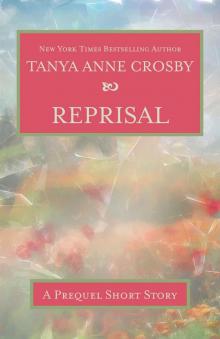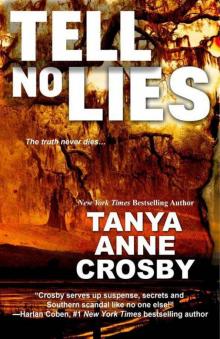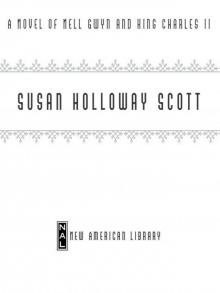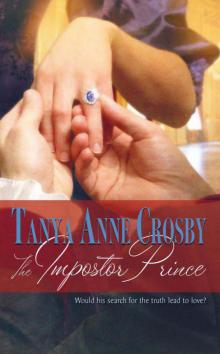- Home
- Tanya Anne Crosby
Reprisal: A Prequel Short Story to REDEMPTION SONG
Reprisal: A Prequel Short Story to REDEMPTION SONG Read online
Reprisal
Tanya Anne
Crosby
This is a work of fiction. Names, characters, places, and incidents either are the product of the author’s imagination or are used fictitiously. Any resemblance to actual events, locales, organizations, or persons living or dead is entirely coincidental and beyond the intent of either the author or the publisher.
Studio Digital CT, LLC
P.O. Box 4331
Stamford, CT 06907
Copyright © 2018 by Tanya Anne Crosby
ISBN-13: 978-1-945839-20-7
Visit our website at www.TheStoryPlant.com
All rights reserved, which includes the right to reproduce this book or portions thereof in any form whatsoever except as provided by U.S. Copyright Law. For information, address The Story Plant.
Punishment is justice for the unjust. —Saint Augustine
Jesus.
That was the name on the display badge.
Accusing eyes the color of primordial soup stared back at Caía through the rearview mirror. The cabbie’s gaze remained ever-present as he sat in judgment from his front-seat throne. But he had no right to judge. Caía’s back was breaking with the weight of her burden. Grief and anger were heaped upon her shoulders, like baskets filled with ten-ton stones.
His name was Jesus.
Gone were the days when Caía might have assumed such a message from the Universe would be one of beneficence. Now, the driver’s ancient eyes crucified her as surely as nails through the palms of her hands. But, really, it’s not as though she meant to kill the man . . ..
Avoiding the cabbie’s intrusive gaze, Caía fumbled with her cell phone, and then, deciding to make herself useful, she opened the airline app and typed in her password, logging in. Her lengthy checklist was done now. Her car was in storage, her life put on hold, and she was hours away from pursuing her own judgment day. Until now, everything had gone so smoothly.
Until now.
The app was working just fine; that wasn’t the problem. She followed directions and scanned in her passport, then sat, blinking at the screen, at the misspelling of her name.
She’d been so meticulous. She’d applied for and received her passport weeks ago, and she’d been so sure all her i’s were dotted and her t’s were crossed. But here it was: proof that no matter how careful you might be, shit happened. Bad shit happened. And that, after all, was the reason she was flying to Spain—though perhaps she wouldn’t be going, after all . . ..
Caía stared dumbly at the misspelling, a terrible sense of panic arising in her breast. Her heartbeat ticked at her temples, pulsing to the rhythm of the cabbie’s furtive glances.
No, God, no.
No, no, no.
Please, no.
She had been so careful, so meticulous.
She’d located Nick Kelly against all odds—persevered until she knew precisely where he was hiding. She’d lied, cheated, and done just about everything short of murder to pinpoint his location on the map. And now, everything was in danger of falling apart.
As though sensing her distress, Jesus peered back at her through the rearview mirror, his black eyes flicking back and forth from Caía to the road ahead. His radio was off. The car’s tires hummed a steady drone over the newly paved road . . ..
Worrying, she brought her fingers to her mouth, stabbing an eyetooth into her cuticle, violating the skin. Already her fingers were stinging and raw.
“Iberia?” the cabbie asked.
Caía sat straighter, forcing her hands away from her face. “Yes,” she said. “Iberia.” And then, frowning, she set the cell phone down on the seat beside her and fished the Google Earth screenshot from her purse. For a long moment, she stared at the salmon-colored building nearly hidden by a massive maple tree. She had tried every angle to get a glimpse of the front door, all to no avail. The tree’s massive spread protected the house no matter which direction she’d come at it. No matter; she had been so determined nothing was going to protect that man.
God damn it.
She let the screenshot slide from her fingers to the seat and once again lifted the cell phone, depressing the button to wake the phone screen, hoping to read something different.
Caía Nowakewna it said.
Not Caía Nowakówna.
Why hadn’t she checked before now?
Only she had, hadn’t she? She expressly recalled opening the envelope and studying the passport, flipping through the pages. She had been so sure everything was right.
Now, her flight was scheduled in four hours and there was no way she was going to have this passport corrected in time to make it. She suspected it would take an act of God—which her curious cabbie most assuredly was not, no matter how ancient and all-knowing his eyes might appear. For the first time during her long months of planning this mission, she second-guessed herself and, subsequently, her motives. She’d arranged everything for an extended stay in Spain, committed to facing the man who’d murdered her boy. But what if the Universe really was trying to tell her something? What if facing that man wasn’t the right thing to do? What if she was barreling, head-first over the edge?
This was her first trip abroad, and she’d been so careful to fill in every line of the passport application exactly right. She had checked and double-checked her entries, so it had never even occurred to her there could possibly be a misspelling in her name. Only now the typo was glaring.
Nowakewna it said.
Not Nowakówna.
Nowakewna.
Somehow, they must have mistaken her ó for an e.
Maybe she could present the passport to the ticketing agent without her driver’s license but, even then, it would necessitate having the airline change her ticket.
Think, she told herself. Think, think. What were the options? Was it possible the airline would make the same mistake in reverse? Note the e and think it an ó?
They were nearing the airport. Feeling a sense of urgency, she looked up the number for the passport agency on her phone and found the Chicago office easily enough. She highlighted the number to make the call and then cast a glance at the driver, wondering if this must be the way criminals felt—guilty before any crime was committed.
On the phone, the woman who answered sounded irritable.
“Hi,” Caía said with a hand to her mouth so her voice wouldn’t carry into the front seat. “I, uh, I’m not sure what to do. I received my passport in the mail—”
“Ma’am, I can’t hear you; you’ll have to speak up.”
“Yes . . . so sorry.” Jesus’s gaze skewered Caía through the rearview mirror. “I said I am not sure what to do. I got my passport in the mail a few weeks ago. I had it expedited, and I didn’t notice until now that there’s a typo in my name.”
“Typo?”
“Yes, ma’am. A typo. In my last name.”
The woman sighed. “I see.”
“The problem is, it’s already ten a.m., and I have to catch a flight in just a few hours.”
“I see,” the woman said again, but not the least bit sympathetic to Caía’s plight. “Unfortunately, you will have to complete form DS-5504 and submit it, along with your passport and evidence of the error. If it’s due to a recent marriage, you’ll also need to submit your marriage certificate.”
Caía tensed. “It’s not a recent change.” In fact, she was getting divorced, but that had nothing at all to do with this. “It was a mistake made by your department.�
�
“You still have to complete form DS-5504 and submit the form, along with your passport and evidence of the error. This is best evidenced by your marriage certificate.”
“But my marriage certificate has nothing to do with this. It doesn’t show my legal name. Won’t my driver’s license work?”
“I’m sorry, no.”
Caía blinked. “But, I don’t understand. I sent you the correct information the first time, when I applied. Do you mean to tell me you need everything again?”
“No, ma’am. Not a photo; we have it on file. We just need you to return your passport, along with form DS-5504 and proof of the error. An acceptable form of proof would be your U.S. birth certificate showing the correct spelling of your last name or a marriage certificate.”
Caía mentally calculated the time it would take to get to her storage unit and go through her boxes. Not for the first time, she was relieved she’d never changed her name from Nowakówna to Paine. Not only would Nick Kelly never recognize her maiden name, but at least she had an easier means to prove her legal name.
“Jesus,” she said, and the cab driver shot her a glance through the mirror. “Okay. All right. I’ll bring the correct documents, but please, please tell me it’s possible to change my passport today.”
“Yes, of course, but you’ll have to come into our office. Are you in the Chicago area?”
“Yes, ma’am.”
“We are at 101 West Congress Parkway. You’ll have to make an appointment.”
“Can I do that now?”
“Yes, ma’am.”
“Okay, well . . ..” Silence, and Caía said, “I’d like to make that appointment.”
The woman fell silent as she presumably checked her schedule and all the while Jesus studied Caía through the rearview mirror, eavesdropping, no doubt.
“My first opening is 2 p.m.”
“Two!”
The woman was far too calm. “Yes, ma’am.”
Caía was on the verge of tears. “But you don’t understand; I have a flight at two.”
“Ma’am, I’m sorry. We’re a very busy office. You can come in and we’ll try our best to squeeze you in, but I can assure you it’s not probable without the appointment. Two p.m. is the only time I have today. The next available appointment is tomorrow at 11 a.m.—and you’re lucky, because these are not typically available same-day.”
Caía wasn’t feeling very lucky. “Please,” she begged.
“I’m sorry,” the woman said again. “Do you want the two o’clock.”
“No. Thank you,” Caía said, and hung up, feeling dismayed. Her stomach turned, and she felt like vomiting at her feet, into the black rubber weather guards Jesus had installed into the back of his cab. Swallowing, she checked the time: It was 10:20 a.m. While she had hours before her flight, there was barely enough time to get to West Congress Parkway and back, much less access her storage, then make the two o’clock appointment. She had roughly three hours and forty minutes, and counting down. She’d come early, having packed her bags more than a week ago, and she had been so damned sure everything was ready to go that all she had to do was show up at the airport stupid-early and get on that flight. Tears formed in her eyes, but smoldered away with the heat of her anger. He was going to get away with it. That’s how this was going to go down. After all her carefully laid plans, he was just going to walk away, scot-free.
Damn it, life wasn’t fair.
None of this was even remotely fair.
Focusing on the memory of her son’s face, she felt a sense of trepidation as the image blurred, fading after so little time. How could it be?
No, she told herself. No.
She was going to get on that plane.
“Is everything okay?” the cabbie asked with a trace of his Spanish accent.
“Yes,” Caía said, as she swallowed again and gathered the contents of her purse. She stuffed everything back inside her bag.
She was going to move forward with her plan. A typo wasn’t going to stop her now. If they said no, then—and only then—would she be forced to consider another plan.
*
10:45 a.m.
Twenty-five minutes later, the cabbie deposited Caía at the proper terminal at O’Hare.
Proceeding with a mixture of fear and faith, she dragged her suitcases up the walkway, into the terminal entrance. Passersby—both coming and going—eyed her critically. Or at least that’s the way Caía imagined it. Just like the cabbie, they had no business judging her. Unless they had suffered what she had suffered, they couldn’t begin to comprehend the depths of her pain and sorrow.
Anyway, morality, according to a professor in college, was subjective. What might be considered criminal in one society, was fair game in another.
Take underage marriages: In some countries, they still married fourteen-year-olds to ancient, wrinkled elders in great celebrations. Here, in the U.S., although it wasn’t exactly a crime to marry underage, so long as the parents were willing to sign legal waivers, sixty-year-old senators who propositioned underaged girls were not viewed favorably, and rightly so.
Fourteen is just a baby.
Jack never even got to see his fourteenth birthday. His life was cut short, ending abruptly on the anniversary of his thirteenth year on this planet. Gone. Just like that.
Because of him.
Because of Nick Kelly.
The very thought of that man in respect to her son made Caía’s knees buckle. She dragged her suitcases to the nearest chair and sat down, shaken.
Not for the first time, tears brimmed in her eyes, but this was the closest she’d come to weeping since her son’s death.
In reality, what could she do? What did she plan to say when she faced the guy responsible for Jack’s death?
What should I do, Jack?
Tell me what to do.
In her fantasies, she pummeled Nick Kelly to death with closed fists—fueled by irrefutable anger over the injustice of life. She pictured him now, in front of her car, with her foot pressing the gas pedal as he crossed the street . . ..
But life had a way of making you stop to think things over, and this was one such instant.
There could be no doubt that if there was a god in heaven, he was telling her now to stop and check herself. Maybe the typo was a sign? Maybe, just maybe, she was not supposed to get on that plane? Maybe this was the Universe’s way of keeping her from doing something stupid.
The passport in her purse was one of two things. It could be an impenetrable stone wall . . . or it might be a speed bump.
It could well be the end of her journey, even before it began.
She couldn’t very well travel internationally without a passport. That was a fact. They wouldn’t allow her to board a plane without proper credentials. And, even if they did, and, somehow, she made it past this first checkpoint, after she arrived in Amsterdam, they would put her right on the next plane returning to Chicago. However, it wasn’t likely they would miss the typo here in Chicago. They would ask her for her identification, and she would give them her passport, and then they would attempt to match it to her ticket—and fail.
But, wait, don’t panic, Caía; mistakes happen all the time.
Like that time she’d flown to Athens, Georgia and showed her boarding pass at the terminal for a flight that had been moved to a new gate. They let her pass, allowing her onto the tarmac and onto the plane before ever realizing their mistake. They had been minutes away from departure when someone boarded and came to tell Caía she was on the wrong flight, en route to Milwaukee.
Mistakes did happen.
Rummaging through her purse, Caía found her passport and took it out. She opened the booklet to the page with her photo and name.
Caía Nowakewna.
That’s what it said.
The diffe
rence of a single letter.
Just one letter.
How was it possible she could be thwarted by a character in an alphabet? All her carefully laid plans toppled by a typo.
She stared at the photo of herself, taken a month after being released from the hospital. There was a natural downturn to her lips that hadn’t previously been there. What was it they said? It took more muscles to frown than it did to smile. But, of course, the intensity of her fury would make that effort inconsequential. In all her life, Caía didn’t believe she’d ever known such ferocity of anger. Nick Kelly ran her son over, and then he’d packed up his neat little life and moved everything to Southern Spain, where he could pretend he was a decent human being. She really needed to remind him that he wasn’t. She needed to face him—and what?
What will you do?
Absolutely nothing if she didn’t get on that plane.
Nothing at all.
He would tootle about, whistling a merry tune, dancing along the streets of Jerez with a long-stemmed rose between his teeth. At least that’s the way she imagined him—with some Spanish bimbo at his side. The thought of his privileged life infuriated her.
A sense of purpose refueled her. Anger bolstered her courage as she, once again, flipped the passport open, glaring at the typo before closing the booklet.
Never, not once during the entire time she’d been in the hospital had he come by to say, “I’m sorry about your son.” And even if Nick Kelly had, would it have been enough?
No.
Gregg might think she was nuts, but she wasn’t. Her friend Lucy wouldn’t speak to her anymore, because she disapproved of Caia’s “obsession.” But it wasn’t Lucy’s place to approve or disapprove of Caía’s actions. She had no comprehension of what it meant to lose a child. Nor could she fathom the pain of losing a sweet little boy before he could become a man. Jack had had his whole life ahead of him. He never even got to open up the present Caía bought him. He’d never felt reassured that Caía hadn’t forgotten his birthday, and, in fact, she was the only one who cared enough to pull together a celebration. She even ordered the cake—red velvet in the shape of a skateboard, with pewter gray icing that had been formed to look like the gritty surface of his board. Caía was going to pick it up that afternoon, and she was going to make him his favorite dinner—pork chops and mac and cheese. And, in fact, she was probably going to be the only parent in attendance, because his dad couldn’t seem to keep his pants on long enough to show up for dinner with his family.

 Lord of Shadows (Daughters of Avalon Book 5)
Lord of Shadows (Daughters of Avalon Book 5) To Love a Lord: A Victorian Romance Collection
To Love a Lord: A Victorian Romance Collection The Daughters of Avalon Collection: Books 1 & 2
The Daughters of Avalon Collection: Books 1 & 2 The Impostors: Complete Collection
The Impostors: Complete Collection The Holly & the Ivy (Daughters of Avalon Book 2)
The Holly & the Ivy (Daughters of Avalon Book 2) A Winter’s Rose
A Winter’s Rose Fire Song (Daughters of Avalon Book 4)
Fire Song (Daughters of Avalon Book 4) Elizabet
Elizabet Kissed; Christian
Kissed; Christian Once Upon a Knight
Once Upon a Knight Viking: Legends of the North: A Limited Edition Boxed Set
Viking: Legends of the North: A Limited Edition Boxed Set Five Unforgettable Knights (5 Medieval Romance Novels)
Five Unforgettable Knights (5 Medieval Romance Novels) Meghan: A Sweet Scottish Medieval Romance
Meghan: A Sweet Scottish Medieval Romance Reprisal: A Prequel Short Story to REDEMPTION SONG
Reprisal: A Prequel Short Story to REDEMPTION SONG Highland Song
Highland Song The Summer Star: One Legend, Three Enchanting Novellas (Legends of Scotland Book 2)
The Summer Star: One Legend, Three Enchanting Novellas (Legends of Scotland Book 2) Once Upon a Kiss
Once Upon a Kiss MacKinnons' Hope: A Highland Christmas Carol
MacKinnons' Hope: A Highland Christmas Carol The MacKinnon's Bride
The MacKinnon's Bride Highland Brides 04 - Lion Heart
Highland Brides 04 - Lion Heart A Perfectly Scandalous Proposal (Redeemable Rogues Book 6)
A Perfectly Scandalous Proposal (Redeemable Rogues Book 6) Reprisal
Reprisal Maiden from the Mist (Guardians of the Stone Book 4)
Maiden from the Mist (Guardians of the Stone Book 4) Tell No Lies
Tell No Lies The King's Favorite
The King's Favorite Meghan: A Sweet Scottish Medieval Romance (Sweet Scottish Brides Book 2)
Meghan: A Sweet Scottish Medieval Romance (Sweet Scottish Brides Book 2) The Impostor Prince
The Impostor Prince Happily Ever After
Happily Ever After Sophie's Heart: Sweet Historical Romances
Sophie's Heart: Sweet Historical Romances Viking's Prize
Viking's Prize Page
Page Angel of Fire
Angel of Fire Once Upon A Highland Legend
Once Upon A Highland Legend Highland Brides 03 - On Bended Knee
Highland Brides 03 - On Bended Knee Sagebrush Bride
Sagebrush Bride Lyon's Gift
Lyon's Gift Lady's Man
Lady's Man The King's Favorite (Daughters of Avalon Book 1)
The King's Favorite (Daughters of Avalon Book 1) Highland Storm
Highland Storm Redemption Song
Redemption Song Three Redeemable Rogues
Three Redeemable Rogues